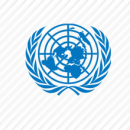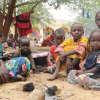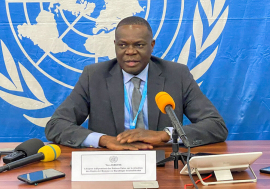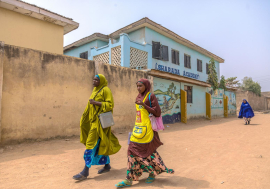UN allocates $13 million from emergency fund to support people in north-eastern Nigeria
UN allocates $13 million from emergency fund to support people in north-eastern Nigeria
27 June 2016 – The top United Nations relief official today released $13 million from a fund that supports rapid humanitarian responses – known as the UN Central Emergency Response Fund (CERF) – to provide life-saving assistance to 250,000 people in areas of north-east Nigeria that have just become accessible.
“People have experienced unspeakable suffering due to the violence perpetrated by Boko Haram. We now have better access finally, and a chance to help them,” said the Under-Secretary-General for Humanitarian Affairs and Emergency Relief Coordinator, Stephen O’Brien, in a news release issued by the UN Office for the Coordination of Humanitarian Affairs (OCHA).
“The international community must take advantage of this opening to reach people with essential services and build on the CERF allocation to scale up the response,” Mr. O’Brien added.
The destruction of crops and looting of livestock have left many people unable to support their families, according to OCHA, which also flagged that more than 50,000 people need seeds and tools for the upcoming planting season and CERF funding will help them to rebuild their livelihoods.
The humanitarian agency also noted that a significant number of women, girls, men and boys have suffered or witnessed terrible abuses, and the CERF funds will enable humanitarian partners to provide critical psychosocial support and protection services.
CERF funds will be used to provide food, cash for food purchase, nutritional supplements, protection and health services to the most vulnerable people in the newly accessible areas. Disbursements will be made through the Food and Agriculture Organization (FAO), the UN Department for Safety and Security (UNDSS), the UN Population Fund (UNFPA), the UN Humanitarian Air Service (UNHAS), the Office of the UN Higher Commissioner for Refugees (UNHCR), the UN Children’s Fund (UNICEF) and the World Food Programme (WFP).
“The humanitarian crisis in north-east Nigeria is massive and alarming: 15 million people are affected by the violence instigated by Boko Haram, including seven million people who need urgent humanitarian assistance,” the acting UN Humanitarian Coordinator for Nigeria, Munir Safieldin, said in the OCHA news release. “Unless we scale up now, seven to eight children will die of severe acute malnutrition every hour; 184 children will die every day. We need resources now to scale up our current response.”
According to OCHA, the Humanitarian Response Plan for Nigeria was revised upwards by $51 million in June and is now calling for $279 million. To date, it is only 22 per cent funded.
Since 2015, CERF has supported life-saving assistance in response to Boko Haram-related violence with more than $58 million. OCHA said that this new injection of funds brings the total CERF support to more than $70 million. In March 2015, approximately $27 million was allocated to assist greater than 1.6 million internally displaced people, refugees, returnees and host communities in Cameroon, Chad, Niger and Nigeria.
An additional $31 million was provided in early 2016 to help 700,000 people in the Lake Chad Basin. As of mid-year 2016, donors have contributed $248 million to CERF, which, in turn, has allocated nearly that same amount to humanitarian partners – in response to their high demand. In its news release, OCHA noted that new contributions are urgently needed.
CERF is a pooled fund in which donors preposition funds so that money is available immediately to kick-start relief operations in new emergencies and to provide live-saving assistance in crises that are underfunded.
















